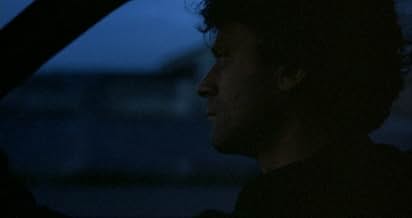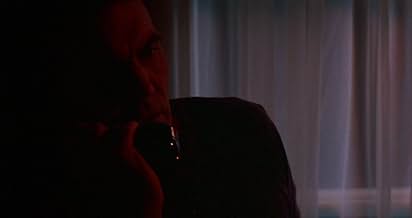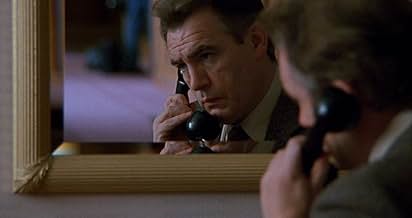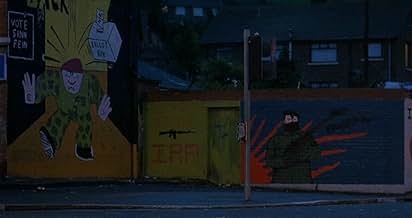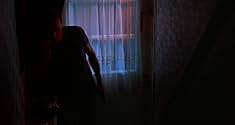VALUTAZIONE IMDb
6,9/10
5051
LA TUA VALUTAZIONE
Quando un avvocato americano per i diritti umani viene assassinato a Belfast, spetta alla fidanzata dell'uomo, nonché a un detective della polizia duro e senza fronzoli, trovare la verità.Quando un avvocato americano per i diritti umani viene assassinato a Belfast, spetta alla fidanzata dell'uomo, nonché a un detective della polizia duro e senza fronzoli, trovare la verità.Quando un avvocato americano per i diritti umani viene assassinato a Belfast, spetta alla fidanzata dell'uomo, nonché a un detective della polizia duro e senza fronzoli, trovare la verità.
- Regia
- Sceneggiatura
- Star
- Premi
- 2 vittorie e 3 candidature totali
Recensioni in evidenza
Ken Loach has made a career out of directing movies about politically charged topics. A lot of his movies have addressed class issues in the United Kingdom, but he has also looked at foreign policy. One example is "Hidden Agenda", about an investigation into the murder of a human rights lawyer in Belfast. Loach not only indicts the British occupation, but also finds time to take a swipe at Margaret Thatcher's government.* While I was watching the movie I assumed that it was based on the murder of solicitor Pat Finucane. It turns out that the movie is a fictional story, but it still makes sure to show the sorts of things that had become commonplace in Northern Ireland. I read that Loach had the cast members meet with people who had gotten abused by British forces to give them an idea of what the movie was dealing with.
Ken Loach also looked at Ireland in "The Wind that Shakes the Barley", about Ireland's war for independence in the early 20th century. Both movies take unflinching looks at what the English did to the Irish for over 800 years. To be certain, "Hidden Agenda" features a scene that should give people pause in the era of the so called war on terrorism: a man sings a song that has the line "you take our land and call us terrorists for resisting". I recommend the movie. Other movies focusing on Northern Ireland that I recommend are "In the Name of the Father", "Bloody Sunday" and "Breakfast on Pluto".
*After Thatcher died, Loach proposed that her funeral should be privatized, since she would've wanted it that way.
Ken Loach also looked at Ireland in "The Wind that Shakes the Barley", about Ireland's war for independence in the early 20th century. Both movies take unflinching looks at what the English did to the Irish for over 800 years. To be certain, "Hidden Agenda" features a scene that should give people pause in the era of the so called war on terrorism: a man sings a song that has the line "you take our land and call us terrorists for resisting". I recommend the movie. Other movies focusing on Northern Ireland that I recommend are "In the Name of the Father", "Bloody Sunday" and "Breakfast on Pluto".
*After Thatcher died, Loach proposed that her funeral should be privatized, since she would've wanted it that way.
Largely forgotten today, the first of two films Ken Loach made about The Troubles generated headlines at the time for a nasty spat at a press conference between Alexander Walker and Loach. As the snappy title suggests it's the nearest thing Loach ever made to a conventional thriller, and although Loach is no Costa-Gavras or Alan Pakula it hold the attention.
Loach inevitably subscribes to the conspiracy rather than the cock-up theory of history, witness the speech that Thatcher's elevation was deliberately engineered rather than simply luck; and he puts a crass and patronising observation about the Irish in a high-ranking Tory's mouth.
A good cast rather surprisingly includes Mai Zetterling making a rare late appearance as an actor in a oddly small part.
Loach inevitably subscribes to the conspiracy rather than the cock-up theory of history, witness the speech that Thatcher's elevation was deliberately engineered rather than simply luck; and he puts a crass and patronising observation about the Irish in a high-ranking Tory's mouth.
A good cast rather surprisingly includes Mai Zetterling making a rare late appearance as an actor in a oddly small part.
Not top-drawer Ken Loach; the "thriller" elements are well-done, but the warmth and depth Loach brings to his working-class stories has no place here. There's a structural flaw in the script, too--it presents itself as a film about Northern Ireland but then jumps headlong into something equally involving but quite different.
It is, all the same, a well-crafted, atmospheric film that never lacks excitement and raises some substantial issues. More importantly, the entire film is sadly prescient. The opening torture narratives could have been translated from accounts of Abu Ghraib prison. Change a couple of proper names and the scenery, and this would be the best film around on the U.S. occupation of Iraq. Even the second half of the story (no spoiler warning, so I give no details) rings truer and truer as time goes by.
Richly deserves reissue.
It is, all the same, a well-crafted, atmospheric film that never lacks excitement and raises some substantial issues. More importantly, the entire film is sadly prescient. The opening torture narratives could have been translated from accounts of Abu Ghraib prison. Change a couple of proper names and the scenery, and this would be the best film around on the U.S. occupation of Iraq. Even the second half of the story (no spoiler warning, so I give no details) rings truer and truer as time goes by.
Richly deserves reissue.
"Hidden Agenda" was an enjoyable political thriller. The story was a somewhat typical Irish against the bloody English set in the late 1980's. The strength of the movie was in the fine acting by Frances McDormand, as usual, Brian Cox and many others. The ending some may find unsatisfactory. It tends to be open ended. I thought it provided much speculation on what Frances McDormand would do. I also thought it to be true to life.
10preppy-3
Just great political drama. It takes place in 1987 Belfast. A human rights activist (Frances McDormand) investigating British brutality against the Irish, and a police inspector (Brian Cox) are investigating the murder of one of her colleagues. They find a huge conspiracy that leads to the highest people in government.
I know only the basics of the conflict in Northern Ireland, but I was able to follow the story. They shot on location and the accents are, at times, incomprehensible, but it actually adds to the movie. The movie looks grimy and bleak...as it should. The movie is VERY critical of England. McDormand and Cox are superb and the movie is very realistic...especially the ending.
Sadly, this movie bombed big in America. It came out before McDormand hit it big with "Fargo" and Cox before "In the Name of the Father". Still, this is well worth seeing. Don't miss it!
I know only the basics of the conflict in Northern Ireland, but I was able to follow the story. They shot on location and the accents are, at times, incomprehensible, but it actually adds to the movie. The movie looks grimy and bleak...as it should. The movie is VERY critical of England. McDormand and Cox are superb and the movie is very realistic...especially the ending.
Sadly, this movie bombed big in America. It came out before McDormand hit it big with "Fargo" and Cox before "In the Name of the Father". Still, this is well worth seeing. Don't miss it!
Lo sapevi?
- QuizThe 'Six Irishmen,' mentioned by Sir Robert Neil of MI5 (with politician Alec Nevin) to Kerrigan is in reference to the 'Birmingham Six.' In 1974 the pub Tavern In The Town and Mulberry Bush, in Birmingham England, was bombed, killing 21 persons and injuring 182 people. The police picked up the nearest six Irishmen and subjected them to 'in-depth interrogation' to obtain false confessions. Patrick Hill, Gerard Hunter, Richard McIlkenny, William Power, John Walker and Hugh Callaghan all served 16 horrific years in jail until the convictions were overturned in 1991. Hugh Callaghan details his ordeal in the book, *Cruel Fate,* co-authored with Sally Mulready in 1994-1995. The movie Nel nome del padre (1993), was based on the Guildford Four, who were similarly jailed using false confessions, along with members of their extended family living in London. That's how the Brits induced Gerry Conlon, Daniel Day-Lewis' character, to confess, by throwing his father, aunts, uncles, and cousins in jail, too. Members of the Guildford Four ordeal were released in 1989 and 1991, where illegal police tactics and hidden evidence were brought to light. The appeals trials of the Guildford Four paved the way for the release of the Birmingham Six, who were in jail longer, and their pleas for appeals were ignored, and never heard until after the Guildford Four / Conlon Family convictions were finally thrown out. All of the innocent Birmingham Six and Guildford Four were still in jail at the time this movie was released.
- Citazioni
Sir Robert Neil: You know Ireland can be a wonderful place... if it wasn't for the Irish!
- Colonne sonoreJoe McDonnell
Written by Brian Warfield
Re-arranged by Ron Kavana
Performed by Ron Kavana and Terry Woods
Published by Skin Music
I più visti
Accedi per valutare e creare un elenco di titoli salvati per ottenere consigli personalizzati
- How long is Hidden Agenda?Powered by Alexa
Dettagli
Botteghino
- Lordo Stati Uniti e Canada
- 1.030.938 USD
- Fine settimana di apertura Stati Uniti e Canada
- 49.827 USD
- 25 nov 1990
- Lordo in tutto il mondo
- 1.232.210 USD
- Tempo di esecuzione
- 1h 48min(108 min)
- Colore
- Mix di suoni
- Proporzioni
- 1.85 : 1
Contribuisci a questa pagina
Suggerisci una modifica o aggiungi i contenuti mancanti


